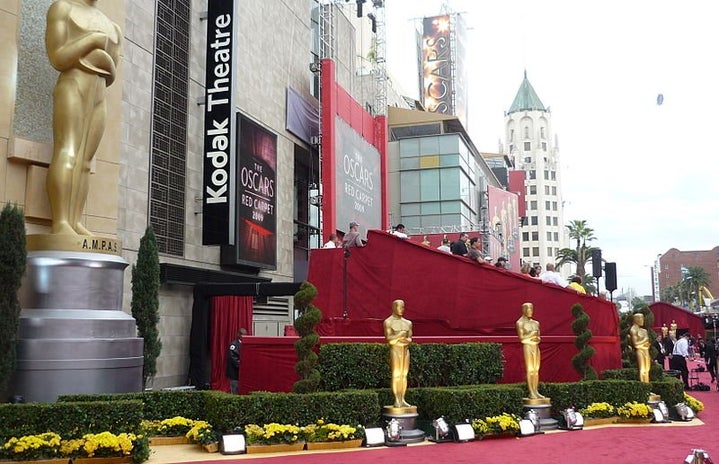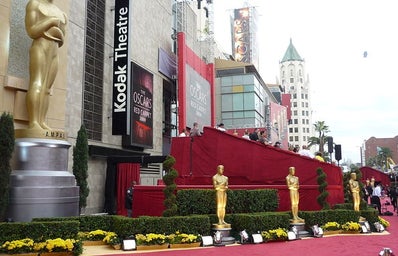This year’s Academy Awards promised to be different. The 95th Oscars made history – it was the first time multiple Asian actors were nominated for acting awards (Ke Quan Han, Michelle Yeoh, Stephanie Hsu and Hong Chau). It was also the first time Asian actors won in major categories (Ke Quan Han won Best Supporting Actor, Michelle Yeoh won Best Actress in a Lead Role). And by the end of the night, the Chinese/English comedy-drama Everything Everywhere All at Once won the biggest award: Best Picture. You might be wondering why I still don’t believe that this is enough, when it’s clear that the Academy is making progressive strides. Yet, Oscars 95 (for all its promise) still faced controversy for snubbing primarily black people and the campaign process. Why, after ninety-five years, can the Oscars still not get it together?
If you were wondering precisely why the Academy still needs to tackle their issues around inclusivity and fairness, look no further than the surprise nomination for Andrea Riseborough. The Academy shocked the whole film world when it announced a nomination as Best Actress for indie actor Andrea Riseborough. Riseborough’s nomination was not met with fanfare or delight. Instead, people were justifiably infuriated and confused by it. People, especially Black people and People of Colour, felt as though it was an insult and yet another example of white privilege in Hollywood. There was public outcry, including critque from entertainment journalist Segun Oduolowu and Get Out actor Lil Rey Howard, who called out the Academy and Riseborough for her nomination in a film (To Leslie) that“no one saw.” And just to put things in perspective, Riseborough’s indie film, To Leslie, made $27,000 at the box office, which is minimal compared to other Oscar nominated films.
Don’t get me wrong, To Leslie is a great film. Riseborough, as stated by critics, gives the best performance of her career in the film about an alcoholic single mother, trying to get her life back on track. The nomination came as a surprise because Riseborough has not been considered by any other of the major award show bodies, which are usually indicators for Oscar nominations. She did not publicly campaign – no interviews, magazine covers and articles, daytime or late-night talk show appearances in the build-up to the nomination announcement. Even the film’s studio, Momentum Pictures, did not fund a campaign for Riseborough this award’s season. So, how exactly did Andrea Riseborough score an Oscar nomination for a film “no one saw”?
The short answer? A word-of-mouth “grassroots” campaign by Riseborough’s (very famous A-lister) friends and To Leslie’s director Michael Morris and his wife, Mary McCormack. In the two weeks before the Oscar nominations were announced, a small group of actors started creating conversation around Andrea Riseborough for her “brave and unsparing performance” in her latest role. Michael Morris and his wife were reported to have utilized their connections in Hollywood to secure a nomination for Riseborough. The two reportedly contacted “everyone they knew” who had connections in the Academy and asked for a favour. In what has been described as a ‘grassroots campaign’, Andrea Riseborough has quickly evolved from an actor no one really knew, in a film hardly seen to an actor no one can stop talking about. Cate Blanchett dedicated the first minute of her Critics Choice Award acceptance speech to praise Riseborough’s performance and seemingly also call out the “arbitrary” awards which overlooked Riseborough. Blanchett was not alone in her newfound appreciation for Riseborough – Kate Winslet, Gwyneth Paltrow, Amy Adams, Jennifer Aniston, Edward Norton, Charlize Theron, Jane Fonda, Courtney Cox, Demi Moore, Helen Hunt, Mia Farrow and even former US president Barack Obama, who listed the film as the best of 2022, expressed their admiration for Riseborough.
And this is why Riseborough’s nomination sparked outrage. It led to speculation that Riseborough, along with her famous friends, had violated the rules of the Academy in their attempt to get her nominated. Riseborough’s campaign was not a rule breaker, but “any tactic that singles out ‘the competition’ by name or title” is not permitted, according to the rules of the Academy. Since the backlash to the announcement of Riseborough’s nomination, the Academy has released two statements. The first promised an investigation into all Oscar campaigns which were successful in securing a nomination, and although the Academy failed to name Riseborough specifically, it was clear the investigation was only being conducted in order to investigate Riseborough. Then, by February 1st, the Academy released another statement: Riseborough’s nomination would stay.
It’s clear why people are angry. As a cinephile, even I am upset by Riseborough’s nod. Her nomination robbed other (more worthy) actresses of a chance for a nomination. In true Oscars fashion, women and black actors were once again overlooked and snubbed by the Academy. Viola Davis, who gave a riveting and transformative performance as warrior Nanisca in The Woman King, and who scored a Golden Globe, Critics Choice and BAFTA nomination, was denied an Oscar nod by the Academy. Danielle Deadwyler (scored a BAFTA and Critics Choice nomination) played Mamie Till in Till (a film about Emmett Till, a 14-year-old Black boy who was abducted, tortured and lynched in Mississippi because he had “offended” a white woman). Despite her previous nominations, Deadwyler was also disregarded by the Academy. The Academy also overlooked Jordan Peele (again), Keke Palmer, Janelle Monae, Lupita Nyong’o, and Charlotte Wells (Aftersun director) was snubbed for Best Director — an Oscars category which featured no women.
Following the brutal murder of George Floyd and the global BLM movement, the Academy released a statement about becoming more diverse. The statement said, “The Academy adds its voice to the call for justice. We must shine a brighter light on racism and do our part to step up to this moment”. Despite these claims, the Academy has once again failed to live up to its promises and three years since their statement have not done enough to truly celebrate BIPOC creatives.
Yet, Riseborough’s nomination reveals something far more unpleasant – the true unfairness of these award shows, namely the Oscars. Riseborough is not the first in Oscars’ history to make use of her star power to secure a nomination. Someone else who frequently did that was none other than disgraced movie mogul Harvey Weinstein. During Weinstein’s heydays, he frequently lobbied for his favourites of the year and those made by his studio, Miramax, to be nominated for Oscars. If you are looking for an example of Weinstein’s aggressive campaigning, look no further than the surprise 1999 win of Shakespeare in Love for Best Picture – a major blindside to many, including Steven Spielberg. Spielberg’s World War II picture Saving Private Ryan had been the predicted winner and academy members had all voiced their praise for Spielberg in the lead-up to the Oscars. However, at the eleventh hour, the film tycoon Weinstein campaigned so aggressively that Shakespeare in Love won the most votes, causing a historical upset.
Weinstein was known to throw tantrums, cause chaos if one went against him and “played dirty” according to Sasha Stone. Weinstein was also a manipulative man, who knew how to persuade people to get what he wanted. Stone said that he was known as the Oscar whisperer because he “knew voters better than they knew themselves.” When accusations of dishonest and unfair campaigns started to pile up, Weinstein responded by saying, “I believe in supporting films. I think you should get into trouble in this town for not supporting films.”
A lot goes into campaigning for the Oscars. In many ways, it is quite similar to running for office. There are constituencies to court, consultants and advisors who create narratives for actors who are ‘running’, targeted advertising and PR teams behind our favourite stars in the lead up to Oscar noms. All this to convince the 10 000 Academy members to vote for their ‘candidate.’ By 2016, Variety found that between $3-$10 million was being spent per year on Oscar campaigns. Yet, openly asking for votes is not permitted by the Academy who will then still allow quiet yet lavish campaigns. It all seems so hypocritical. And while Riseborough is certainly not the first to make use of the discrepancies within the system, she exposes the ugliness of these Award shows.
The way Riseborough secured her nomination – by calling a friend of a friend who has a powerful friend –– – was unfair and should have disqualified her. Yet, her nomination proves two things: one, the Oscar campaigns have become more about who you know and how much money you’ve got. Two, the Academy (despite promising change) still does things the way they have always been done, like when Weinstein was still around. If Oscar campaigns are so easily corrupted, does it matter who gets nominated? Is the Academy nominating truly exceptional films, which are worth appreciation? While Michelle Yeoh, the first Asian woman to win Best Actress and the first WOC to win in twenty years, brings hope that the Academy is ready to get with the times, it feels unlikely when they disregarded so many other Black creatives. The Oscars, which have historically excluded BIPOC and women, have not changed at all. And that’s why we are all so upset at Riseborough’s nomination. However, I don’t blame her for the flaws within the Academy’s system – I blame the Academy. They continue to perpetuate an elitist and exclusionary cycle, where connections trump talent and money beats hard work. The Academy’s failure to recognise so many other talents and their favour of Riseborough due to her word-of-mouth campaign reveals just how easy it is for some (white actors) to get what they want. And there is no one who bears more responsibility for this than the Academy. So, what will this lead to? A complete re-write of Academy regulations? Or, completely denouncing the Oscars for being too white, over the top and unimportant?


